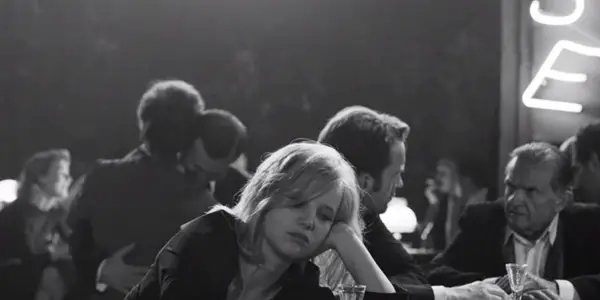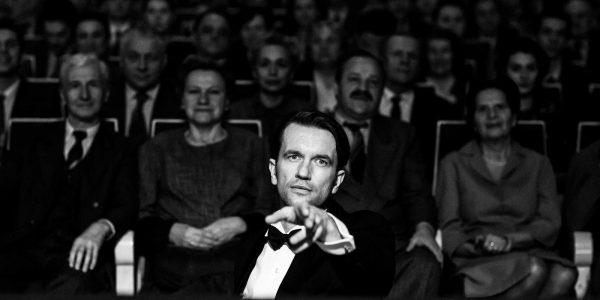Escaping Time In Paweł Pawlikowski’s COLD WAR
Jack is a recent MA Graduate from the film department…
“Time doesn’t matter when you’re in love.”
For the characters of Cold War, time is not deemed important when they are away from each other. The film races through their lives in eighty-eight overwhelming minutes of run-time, with the moments away from each other missed out entirely, judged as uninteresting – the film does not care for their lives away from one another. In this world of fear and violence, the world of late 1940s Poland, Wiktor (Tomasz Kot) and Zula (Joanna Kulig) are only themselves when with each other; or rather they are who they wish they were when they embrace the one they love.
The Still Eyes of God
Eyes follow them everywhere. The audience watches the characters with sadness, fears for their future, while the world watches them with ambivalence – cold eyes follow them around the world, from those of other characters to the huge, wide eyes of various pieces of art, the eyes of god looking down on their ill-fated passion. This ambivalence is matched by the stillness of the camera, the remarkable quiet that drips from the movie, slowing time down to a crawl. This is a film that comes with a chill of the winter in its bones, as simple shots of a ruined church or a tiny apartment are lingered upon as equals. There lies the power of Paweł Pawlikowski’s direction, as the stillness and quietness of each framing image gives an air of disquiet: it is filmed as one might film a funeral, with a steady hand, a solemn outlook, free of nervousness and tension, but not free of sadness.

The stillness of the picture creates a sense of inevitability. Near the beginning of the film there is a supposedly innocuous scene where Kaczmarek, perhaps the closest thing the film has to a villain (although such a label is perhaps unfair) visits a small church, crumbling at the edges. Pawlikowski films the Church extraordinarily, with its open ceiling shot from below and the faded faces of the paintings shot straight on, forcing the audience to look into their eyes. The snow has crept into the Church but only to a border, where the ground suddenly turns black on the way to the alter.
We return to this Church for the finale, in the beating sun of spring this time, as Wiktor and Zula prepare to commit suicide inside its walls. We return to that shot of the open ceiling, trees still peeking through edges, and those sad eyes of that faint painting, same as it was, years and years later. The Church has not changed an inch since Kaczmarek visited it, Pawlikowski does not frame it or treat it any differently – it has seen a million couples like these, seen what Poland has done to them, and we are left to ask, does it care?
A Cursed Liberation
Time cannot be run away from, cannot be bribed or bargained with, and maybe this is what Cold War is about. Wiktor and Zula escape from their lives in each other’s arms but once they have each other, actually escape their surroundings and into the free land of Paris, they suddenly succumb to the pressures of love; jealously strikes Zula while Wiktor suddenly becomes uninterested, slightly patronising – perhaps the cold war of the title is manifesting itself into their relationship, freezing them away from the people they love.
The extraordinary dance scene at a bustling nightclub, where Zula walks away from the comfort of Wiktor’s cold company and decides to dance with the drunks, is filled with an almost nervous kind of life behind the camera, as it sways and leers to each step of her feet. She dances from man to man, the camera dancing around her with an unexpected sort of joy, and we start to feel the love of Paris on behalf of the characters. Finally we get to see the liberation of this city, we have a brief insight into why they came here, what it means for these characters to be free, to be happy, for only a few seconds.

But that liberation isn’t enough to save either Wiktor or Zula. Frustrated at the bitterness engulfing their relationship and alienated by the poets, directors, artists that look down to her, Zula impulsively decides to go back to Poland, framed as the land of the cold, the land of the dead, almost in a mood swing provoked by suddenly falling out of love. After all, the hardship of Poland, its bitter edges and violent outbursts, blossomed the love that Wiktor and Zula felt for each other – their hardship and their surroundings brought them together. To recapture that love they find themselves both back in that country they had tried so desperately to escape, as Wiktor is imprisoned and crippled for trying to follow Zula over the border, illegally.
When things got better for them, when they finally found a way to live together in a land of freedom, they hardly seemed to know each other; their relationship is often twisted, romantically framed against a backdrop of terror and misery. Perhaps they are reliant on these conditions, the cold war of their lives distracting from the cold war of love. Distracting from the reality that, when presented with real time with each other, Wiktor and Zula don’t find much to love about each other.
Craving A Beautiful View
At the end of Ingmar Bergman’s Wild Strawberries, there is an extraordinary image of the main protagonist, Isak, watching his parents peacefully fishing on a riverbank, restored to their younger selves by the power of the dream. They are distant to him, faceless figures on the ridge between land and water, but they wave to him and a comfort exudes from, a warmness that cinema rarely captures.
At the end of Cold War I was reminded of this perfect shot; both Bergman and Pawlikowski understand that life beyond this one can be framed as a beautiful thing, cannot only be one of bliss but one of total escape as well. After Wiktor and Zula take the pills that will take their lives they sit on a bench, a bench in front of a field of hay and just below a huge, wonderful tree. Pawlikowski makes us watch them for an age – there is a total stillness and terror to their calmness, and we wonder, will one of them suddenly drop dead? Is this the end of their story, shot in perfect clarity, camera unmoved, hand unwavering in the face of death?
The silence is broken by Zula. She takes her lover by the hand and says:
“Let’s go to the other side. The view will be better there”.
The camera stays on the bench as they both leave the shot and, seconds later, a small gust of wind blows the field of wheat ever so slightly.

We have spent about 88 minutes with Wiktor and Zula; we’ve seen their highs and their lows, their hellos and goodbyes, as quick and as fleeting as that final gust of wind. They were only ever themselves when with each other and we, the audience, feel the chill of the world’s loss, the simple fact that their love couldn’t save them from a world that was determined to wear them down. Pawlikowski makes their story fly through the mind, makes us yearn for more details, more minutes to spend, and yet it is as over as suddenly as it began when they leave the frame for the final time.
When Bergman framed the end of one’s life as a beautiful reunion in Wild Strawberries, it was the culmination of an old man’s life, the final and peaceful end to a life that, in the end, was well lived. Pawlikowski’s outlook is a similar one of peace, one of a beautiful view at the end of a long road of suffering and yet the consequences, the implications, are far more tragic and disturbing. Pawlikowski films this ending with beauty and love, that same trademarked stillness that has dominated the film – it is filmed as such because, maybe, this is the first decision of agency that the characters have managed to make in their lives.
We are sad at the end of Cold War, but, thanks to the tragedy of the narrative, the love that has spiralled down and soured between these two souls, perhaps we are hopeful as well. Maybe we hope that the view really is better on the other side.
What did you think of Cold War? Let us know in the comments!
Does content like this matter to you?
Become a Member and support film journalism. Unlock access to all of Film Inquiry`s great articles. Join a community of like-minded readers who are passionate about cinema - get access to our private members Network, give back to independent filmmakers, and more.
Jack is a recent MA Graduate from the film department at the University of Southampton. He has been writing about film and football casually since 2013, considering himself as an expert on the works of Akira Kurosawa, Park Chan-wook and Steve McQueen ; less of an expert on every other important director.













